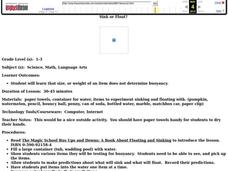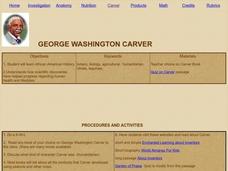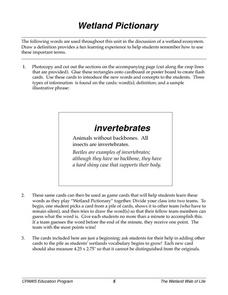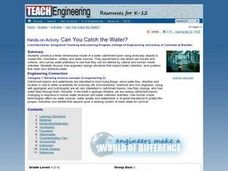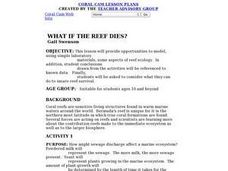Curated OER
Garbage Plants
Students create plants out of garbage. They identify items that can be recycled and discuss natural resources. They share their creation with the class.
Curated OER
M&M Probability
Students apply the scientific method in order to determine the probability of specific colors in a bag of M&M's. They determine the definition of probability and how it can be used. They make a hypothesis and conduct an experiment to...
Curated OER
Sink or Float?
Students predict and test different items to see if they sink or float. In this sink and float lesson plan, students predict whether an item is buoyant or not, and learn that size and weight do not matter when it comes to buoyancy.
Curated OER
Garbage in the Garden
Students create their own compost. In this soil lesson, students fill a bag with waste and soil, in order to create a mini compost bin. Students observe the baggies over a 6 week period, they record their findings and collect data...
Curated OER
George Washington Carver
Students learn and research the life of George Washington Carver. In this historical figures instructional activity, students read a book on George Washington Carver, discuss his character and the challenges he faced in becoming a...
Curated OER
Google Earth Landforms
In this lesson, Google Earth Landforms, students research a landform that has been studied in class. Students explore Google Earth and record everything they find about their landform. Students have the opportunity to extend their...
Curated OER
Forest Ecosystem Field Trip
Students investigate the environment by participating in a class field trip. In this botany lesson, students attend a field trip through their local park or forest while listening to a nature guide. Students practice using their 5 senses...
Curated OER
Living it up with plants
Have kids in grades K-2 discuss how they know a tree is alive. The worksheet provides simplistic background information and an observation check list. They check off the ways that they can tell an oak tree is a living thing. Note: The...
Curated OER
The good microbes
The question posed for the class to consider; What would decay and what would not? They read the short passage on decomposition and microbes, then mark the items that would decay after a two-week period. A scientific investigation idea...
Curated OER
Seashore Explorers
There are three separate lessons within this resource that can be used together, or that can each stand alone. In the first, five simple activities allow junior scientists to examine the amazing properties of water. In the second, they...
Curated OER
Ice Cream in a Bag
Students discuss the three states of matter and how they are affected by temperature. They make ice cream in a bag while observing how temperature change affects the mixture. They discuss why some specimens froze more quickly than others...
Curated OER
The Alphabet Garden
Third graders transplant, tend and observe a plant for each letter of the alphabet in a school garden. They work individually to research and select a plant that will grow in their local climate. Students then care for and observe the...
Curated OER
Wetland Pictionary
Students create a game for reviewing vocabulary. They make cards with definitions of the words. Then the cards are used to play the game of Pictionary or a modified game. The teacher could have the students generate their own game in...
Curated OER
The City From the Ooze
Students investigate the life in the mud found around ponds. They create Ooze City using pond mud. Students investigate the various layers that form and what type of organisms are in the mud.
Curated OER
Bird Stories: Fact or Fiction
Students evaluate/distinguish scientific fact from fiction. They discuss similarities and differences in the life cycles of various birds. Student use the Internet as a research tool.
Curated OER
When Fish Die
Students discuss what to do with a very sick fish and help it to die without much pain. As a class, they answer questions about the fish and if they believe it is suffering or not. Using their own experiences, they share how they dealt...
Curated OER
Night Creatures of the Kalahari
Learners conduct an experiment to demonstrate how fruit fly populations are controlled by spiders. They observe a variety of environments with fruit flies and spiders and consider how vital spiders are to controlling the insect population.
Curated OER
Up, Up and Away
Third graders are presented with the problem of: Do all liquids evaporate at the same rate? The lesson contains adequate background information for the teacher. They participate in a lab experiment in order to test the scientific...
Curated OER
Can You Catch the Water?
Pupils work together to construct a model of a water catchment basin. They survey water patterns and complete experiments to see where rain travels and collects. They discover how engineers design structures that help with drainage.
Curated OER
From Caterpiller to Butterfly: Cycles, Circles, and Patterns
Students examine art of butterflies and discuss what they know about the insect. They create their own butterfly puppets and write a story to represent its life cycle.
Curated OER
Look Out, Below!
Students study the four layers of soil while identifying the substances that each level is composed up. They investigate the properties of soil such as color, texture, water retention and the ability to maintain life by growing a plant.
Curated OER
What If the Reef Dies?
Learners complete four activities to investigate how reef ecology can change. They perform experiments to show how sewage discharge can affect a marine ecosystem, look at substances that don't dissolve in water, examine wave action...
Curated OER
Aquatic Communities
Students watch a video about aquatic communities. They conduct an experiment that shows how movement of rivers change the landscape. They compare fresh and salt water communities and its wildlife.



